Holocaust survivors, leaders of Shoah Foundation awarded University Medallion
The honorees are the fourth to receive USC’s highest recognition.
The honorees are the fourth to receive USC’s highest recognition.
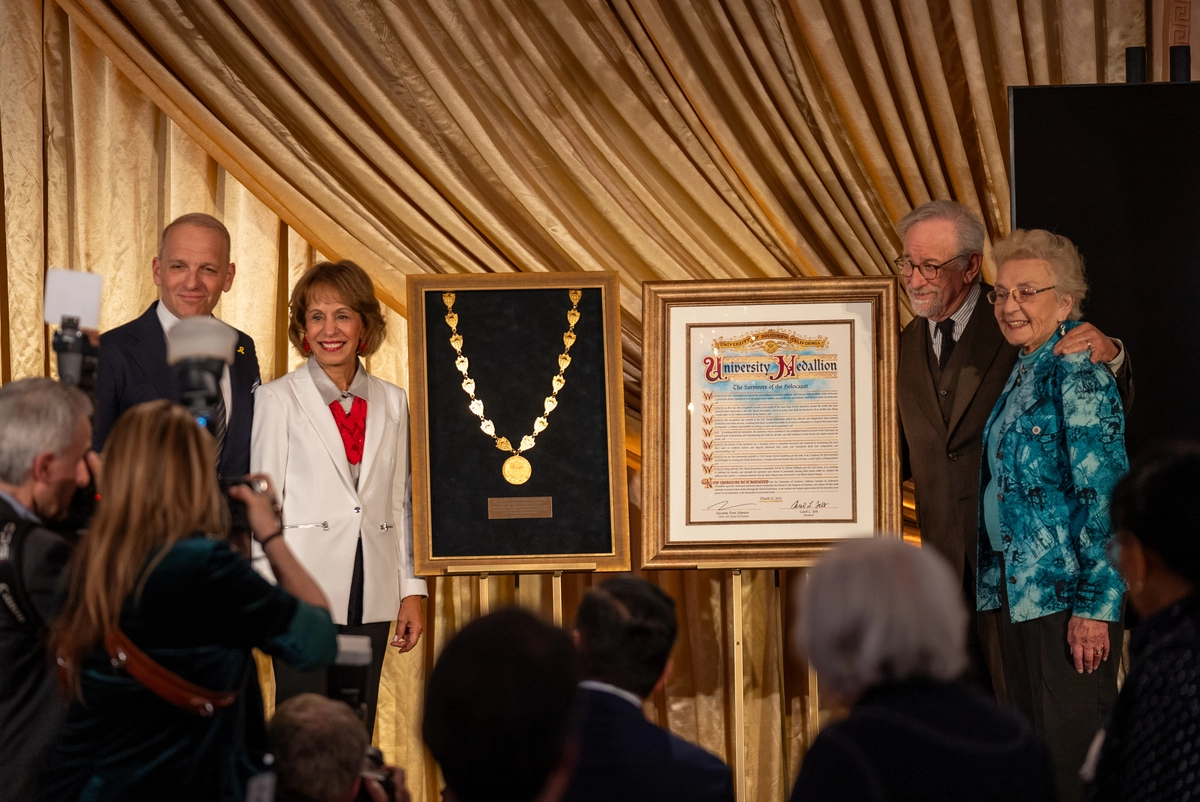
President Carol Folt presented Holocaust survivors and leaders of the Shoah Foundation — The Institute for Visual History and Education with the University Medallion, the fourth time USC has awarded this recognition in its history.
The ceremony recognized the Shoah Foundation’s 30th anniversary and honored the over 30 Holocaust survivors in attendance. Speakers also reflected on the ongoing rise in antisemitism across the world and on United States college campuses — especially after Hamas’ Oct. 7 attack on Southern Israel and Israel’s ongoing war in Gaza.
“It is USC’s mission to preserve and protect these eyewitness accounts in perpetuity, and awarding the University Medallion is one way that we do it,” Folt said in her remarks. “It will forever be a public display of our commitment to ensuring the testimonies of survivors will be preserved for generations to come.”
The University Medallion is a recognition granted to those who have made “major contributions to the university,” according to USC. This is the first award granted to nondonors since the first honoree in 1994; other awardees include Wallis and Walter Annenberg, as well as Dana and David Dornsife.
Filmmaker and Shoah Foundation Founder Steven Spielberg spoke at the ceremony with Robert Williams, the Finci-Viterbi executive director of the Shoah Foundation, and Board of Councilors Chair Joel Citron.
The event also featured a performance of “Ani Ma’amin” — a traditional Jewish prayer which translates to “I believe” — by Leslie Goldberg, a third-year cantorial student at Hebrew Union College and a conversation with Rae-Anne Serville, a senior majoring in health and human sciences, and a USC track athlete who visited Poland in Summer 2023 to learn about the Holocaust during the Shoah Foundation’s Stronger Than Hate Leadership Summit.
Over 260 people attended the ceremony, including Holocaust survivors who have provided testimonies to the Shoah Foundation. Spielberg — who was inspired to found the Shoah Foundation after his work on “Schindler’s List” (1993), the film that dramatized Oskar Schindler’s effort to save the lives of about 1,200 Jews — said the stories of Holocaust survivors are one of the strongest weapons against antisemitism.
“The one thing that always punctured that darkness [producing ‘Schindler’s List’] was when Holocaust survivors would visit us in Kraków where we were filming and I remember every survivor that had a story to tell me,” Spielberg said. “It pained me that their stories were not being documented as proof of what happened unto them and to all the Jews.”
The event included remarks from Holocaust survivors Shaul Ladany and Celina Karp Biniaz, who accepted the award on behalf of all other Holocaust survivors. Biniaz is one of the last living survivors from Schindler’s List.
Biniaz was eight years old when the Nazis occupying her city forced her and her community into a ghetto in Kraków, Poland in 1941, and later to the Kraków-Płaszów and Auschwitz-Birkenau concentration camps. In 1944, she became the youngest woman included on Schindler’s List. In the years following the war, Biniaz said she rarely talked about her experiences.
“Even my children didn’t know I was a Holocaust survivor, because I didn’t want them to relive my trauma; that changed after I saw ‘Schindler’s List,’” Biniaz said. “Thanks to [Spielberg], I can tell the world about how the Nazis stole my childhood.”
Multiple speakers said the Shoah Foundation’s work in documenting and combating antisemitism is more important than ever following the Oct. 7 attacks. Less than one week after the attacks, the Shoah Foundation launched an initiative to collect testimonies from the attack as part of their series on contemporary antisemitism. Since then, the archive has amassed over 230 accounts and counting.
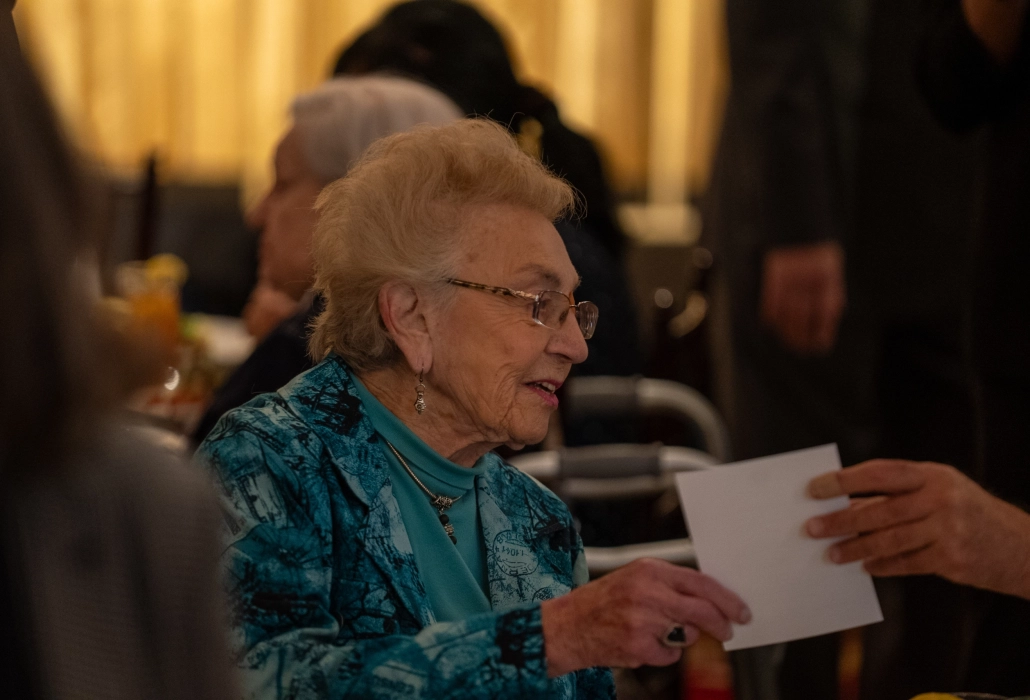
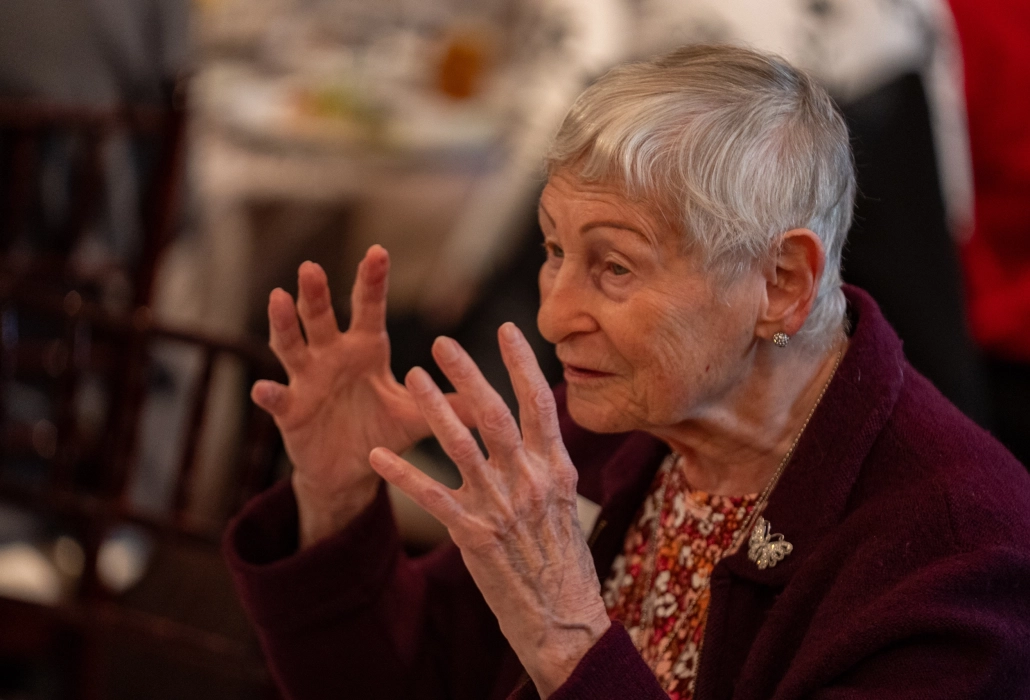
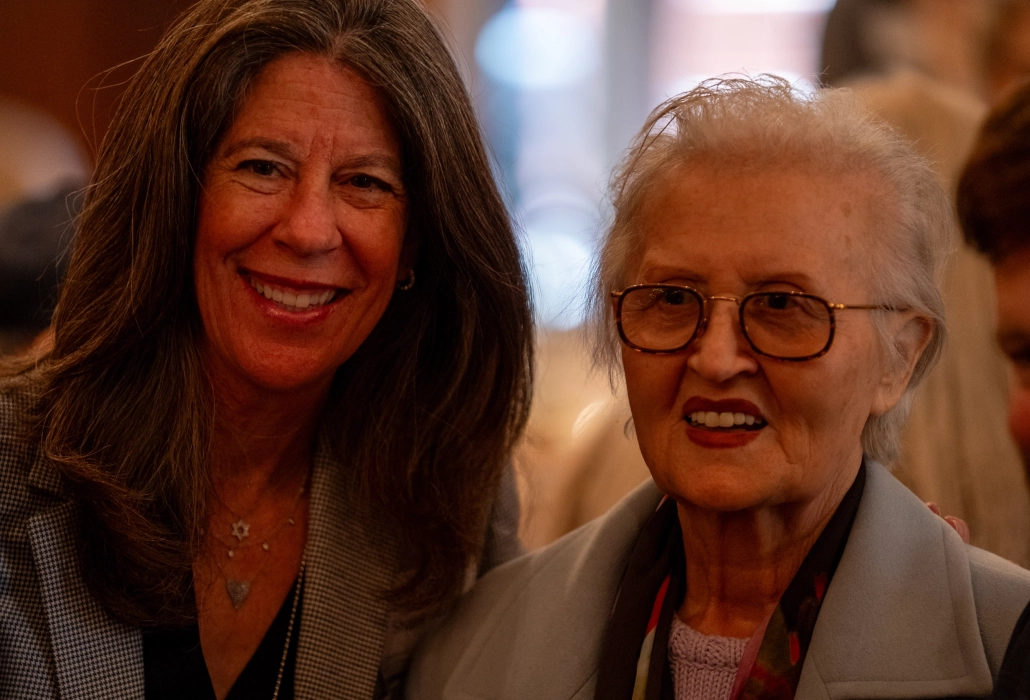
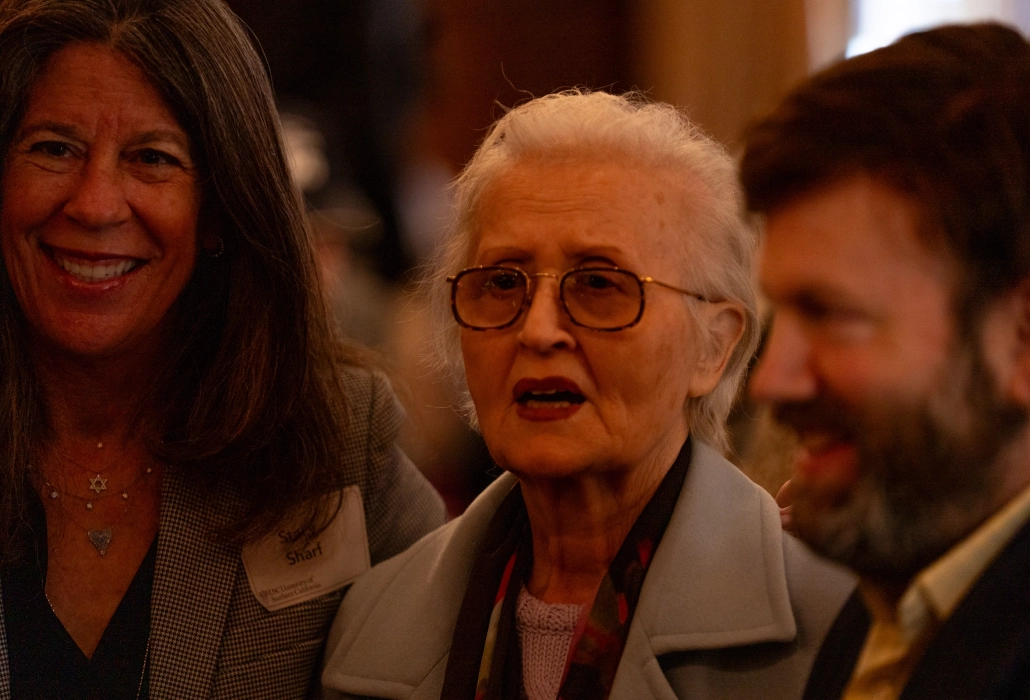
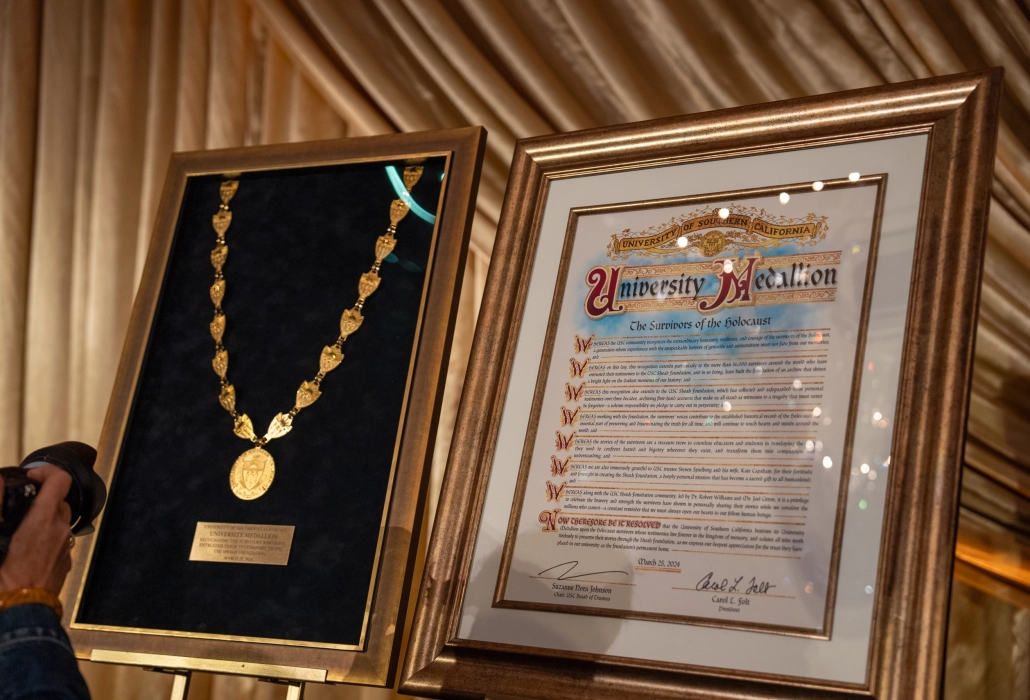


The Anti-Defamation League found that antisemitic incidents surged by 360% in the three months following Oct. 7, 2023 compared to the previous year’s numbers. The ADL recorded instances of physical assault, vandalism and rallies that expressed support for terrorism against the state of Israel or anti-Zionism in its tally, which reached 3,291 — a number higher than most yearly totals in the past 10 years.
College campuses across the country have served as a forum for tensions surrounding the war and race and religious bias to boil over, including on USC’s campus.
From the controversial first statement that Folt released acknowledging the attacks, which some condemned as “weak,” to the tumult surrounding a professor’s clash with demonstrators memorializing Palestinians in Gaza killed after Oct. 7. Jewish students and community members said Folt and USC administration weren’t doing enough to support the campus Jewish community.
Dave Cohn, the executive director of USC Hillel Jewish Center, attended the event and said he was struck by how the event demonstrated USC’s commitment to living its values by honoring the Shoah Foundation’s work, though he said USC’s work in building a strong Jewish community on campus is incomplete and ongoing.
“The question that lives with me, day to day, is always ‘How will we perform when we’re next deeply tested?’” Cohn said. “We have a really high-functioning partnership and relationship with the University, which leads to a generally supportive and safe climate for our students, which is a really strong baseline.”
We are the only independent newspaper here at USC, run at every level by students. That means we aren’t tied down by any other interests but those of readers like you: the students, faculty, staff and South Central residents that together make up the USC community.
Independence is a double-edged sword: We have a unique lens into the University’s actions and policies, and can hold powerful figures accountable when others cannot. But that also means our budget is severely limited. We’re already spread thin as we compensate the writers, photographers, artists, designers and editors whose incredible work you see in our daily paper; as we work to revamp and expand our digital presence, we now have additional staff making podcasts, videos, webpages, our first ever magazine and social media content, who are at risk of being unable to receive the support they deserve.
We are therefore indebted to readers like you, who, by supporting us, help keep our paper daily (we are the only remaining college paper on the West Coast that prints every single weekday), independent, free and widely accessible.
Please consider supporting us. Even $1 goes a long way in supporting our work; if you are able, you can also support us with monthly, or even annual, donations. Thank you.
This site uses cookies. By continuing to browse the site, you are agreeing to our use of cookies.
Accept settingsDo Not AcceptWe may request cookies to be set on your device. We use cookies to let us know when you visit our websites, how you interact with us, to enrich your user experience, and to customize your relationship with our website.
Click on the different category headings to find out more. You can also change some of your preferences. Note that blocking some types of cookies may impact your experience on our websites and the services we are able to offer.
These cookies are strictly necessary to provide you with services available through our website and to use some of its features.
Because these cookies are strictly necessary to deliver the website, refusing them will have impact how our site functions. You always can block or delete cookies by changing your browser settings and force blocking all cookies on this website. But this will always prompt you to accept/refuse cookies when revisiting our site.
We fully respect if you want to refuse cookies but to avoid asking you again and again kindly allow us to store a cookie for that. You are free to opt out any time or opt in for other cookies to get a better experience. If you refuse cookies we will remove all set cookies in our domain.
We provide you with a list of stored cookies on your computer in our domain so you can check what we stored. Due to security reasons we are not able to show or modify cookies from other domains. You can check these in your browser security settings.
These cookies collect information that is used either in aggregate form to help us understand how our website is being used or how effective our marketing campaigns are, or to help us customize our website and application for you in order to enhance your experience.
If you do not want that we track your visit to our site you can disable tracking in your browser here:
We also use different external services like Google Webfonts, Google Maps, and external Video providers. Since these providers may collect personal data like your IP address we allow you to block them here. Please be aware that this might heavily reduce the functionality and appearance of our site. Changes will take effect once you reload the page.
Google Webfont Settings:
Google Map Settings:
Google reCaptcha Settings:
Vimeo and Youtube video embeds:
The following cookies are also needed - You can choose if you want to allow them:
